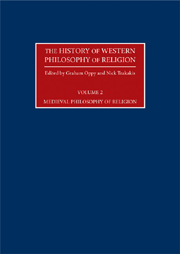Book contents
- Frontmatter
- Contents
- Editorial Introduction
- Contributors
- 1 Medieval Philosophy of Religion: An Introduction
- 2 Boethius
- 3 Johannes Scottus Eriugena
- 4 Al-Farabi
- 5 Avicenna (Ibn Sina)
- 6 Anselm of Canterbury
- 7 Al-Ghazali
- 8 Peter Abelard
- 9 Bernard of Clairvaux
- 10 Averroes (Ibn Rushd)
- 11 Moses Maimonides
- 12 Roger Bacon
- 13 Thomas Aquinas
- 14 John Duns Scotus
- 15 William Ockham
- 16 Gersonides
- 17 John Wyclif
- 18 Nicholas of Cusa
- 19 Erasmus of Rotterdam
- Chronology
- Bibliography
- Index
10 - Averroes (Ibn Rushd)
- Frontmatter
- Contents
- Editorial Introduction
- Contributors
- 1 Medieval Philosophy of Religion: An Introduction
- 2 Boethius
- 3 Johannes Scottus Eriugena
- 4 Al-Farabi
- 5 Avicenna (Ibn Sina)
- 6 Anselm of Canterbury
- 7 Al-Ghazali
- 8 Peter Abelard
- 9 Bernard of Clairvaux
- 10 Averroes (Ibn Rushd)
- 11 Moses Maimonides
- 12 Roger Bacon
- 13 Thomas Aquinas
- 14 John Duns Scotus
- 15 William Ockham
- 16 Gersonides
- 17 John Wyclif
- 18 Nicholas of Cusa
- 19 Erasmus of Rotterdam
- Chronology
- Bibliography
- Index
Summary
Abū-l-Walīd Muḥammad ibn-Muḥammad ibn-Rushd, known in the Latin West under the Hispanicized name ‘Averroes’, was, like his ancestors, a jurist in Islamic Andalusia. He became Chief Judge of Cordoba and Seville, court physician to the Almohad princes of Morocco and Spain, counsellor and courtier in the orbit of power. He belonged to the three worlds of intellectual culture in his age: he was brought up in the world of the ʿulamā, learned exegetes and administrators of the Sharīʿa (the revealed law of Islam); he mastered the world of the rational sciences – applied in medicine and astronomy, and crowned by the universal wisdom of philosophy that was taken to lead the way to true wisdom and ultimate happiness; and he rose to high station in the world of court, where the Commander of the Faithful ruled as absolute king. He embodied the sum of intellectual excellence and active experience a person could gain in his time and place.
The religious community, and the political conditions, of Muslim Spain underwent deep changes in Averroes' lifetime. His project – to give a rational foundation to the Muslim doctrine and in the long run to vindicate the work of philosophy as a rule of reason governing all of society – with its progress and its setbacks, was closely connected with the social condition, the spiritual outlook and the dialectic of power and authority in the Andalust.
- Type
- Chapter
- Information
- The History of Western Philosophy of Religion , pp. 121 - 136Publisher: Acumen PublishingPrint publication year: 2009

